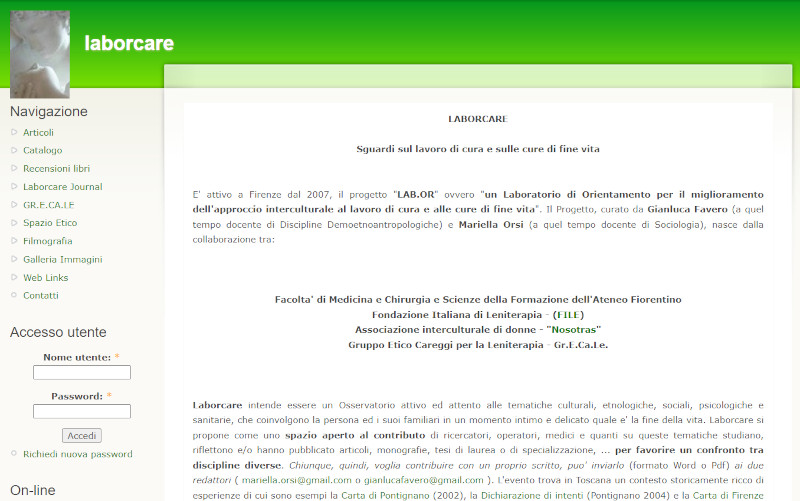
Gianluca Favero and Mariella Orsi: Why “Laborcare Journal?”
Editor-in-Chief and Editorial Director tell how they decided to edit the Laborcare Journal
In 2007, after careful consideration of the extent to which Health Professions students felt the need to learn more about “end-of-life” issues, we created the laborcare.it portal defined as “an Orientation Laboratory for the improvement of the cross-cultural approach to end-of-life care.” Over the years, the Laborcare site has been implemented by more voices and visited not only by professionals working in health care, volunteer work and devotees of end-of-life issues but, above all, by students who have identified in this site a “place” where they can find useful material for their studies and, also, to write their dissertations.
It was precisely the students who, little by little, contributed to enrich with testimonies and written theses and reflections, the Laborcare site.
With the passage of time, “a place” has taken shape where we can rethink the end of life in a ‘historical era in which the theme of dying, continues to experience its contradictions favored by an increasing adherence to technology that, progressively, reduces the Person to a “body” consisting of “organs to be adjusted.”
We continue to be moved by seeing films or reading testimonies in which it is “others” who die. Not a year goes by, in fact, when films or books centered on end-of-life issues are not produced .
Death is deprived of the scene that Man has always given it; Ignazio Marino speaks of “technical death,” a death relegated to the pure biological event for which Medicine continues to feel defeated. Over the course of these years, the events of people such as Welby, Englaro, Schiavo, Monicelli and so many others have transformed end-of-life choices into a “subject of discussion” in the media and among the various political forces, which, while on the one hand, have drawn the attention of citizens to the issues concerning the end of life, on the other have produced drifts that risk dispossessing us of “our dying.”
Death, like birth, are the foundational elements of everyone’s biography; they are unique and intimate events to be shared with loved ones.
In this “modernity,” health care professionals increasingly run the risk of becoming numbers, “barcodes” just as Zygmunt Bauman states, “recipients of ‘care are increasingly reduced to exemplars of legal cat- gories and the process of “face removal” endemic in every bureaucracy has been set in motion.”
Just as with the face, the need for time is also “removed,” expropriated in the name of “making haste” locked in acronyms, procedures, moments experienced as a “scanning” of the everyday that compresses what we experience and relegates it to a memory destined to be lost.
Over the past year, the idea has, therefore, matured to join the site with an online periodical called “Laborcare Journal,” which can be downloaded for free from the site and which, on a quarterly basis, will offer material for study and reflection on issues related to death and the dying process. As already for the laborcare.it site, we urge all those who wish to share testimonies of best practices and/or experiences of care to send their contributions to the Editorial Board of Laborcare Journal which, after evaluation by the Scientific Committee as well, will be published.
Happy reading!
Gianluca Favero
Editor-in-Chief
Mariella Orsi
Editorial Director
